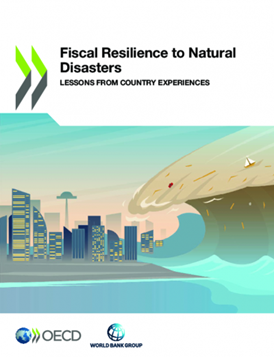Fiscal Resilience to Natural Disasters: Lessons From Country Experiences
The international debate on strengthening the financial resilience to disasters is more front and center than ever before. Recurring hurricanes and floods, large-scale devastating wildfires and massive earthquakes are costing lives and create a significant negative impact on people’s well-being and economic development.
This joint report by the OECD and the World Bank takes stock of how a sample of governments in OECD and non-OECD countries manage the implications of natural disasters for public finances. The findings of this joint work were presented to Finance Ministers as part of the Asia-Pacific Economic Cooperation (APEC) Finance Ministers’ Meeting in Port Moresby, Papua New Guinea in October 2018. Yet many countries are still struggling with the challenge of developing more effective financial instruments to counter the economic impact and strengthen financial resilience to natural disasters. Disasters simultaneously affect the government balance sheet from two sides. In their efforts to contain negative impacts on social and economic welfare, governments have often assumed the lion’s share of recovery and reconstruction costs. At the same time, disasters can also reduce government revenues due to disruption in economic activities. Boosting Fiscal Resilience: Managing Disaster-Related Contingent Liabilities in Public Finance Frameworks makes the case for how integrating disaster and climate risk in fiscalplanning and budgeting frameworks in advance helps make countries more financially resilient.

Please download it below.